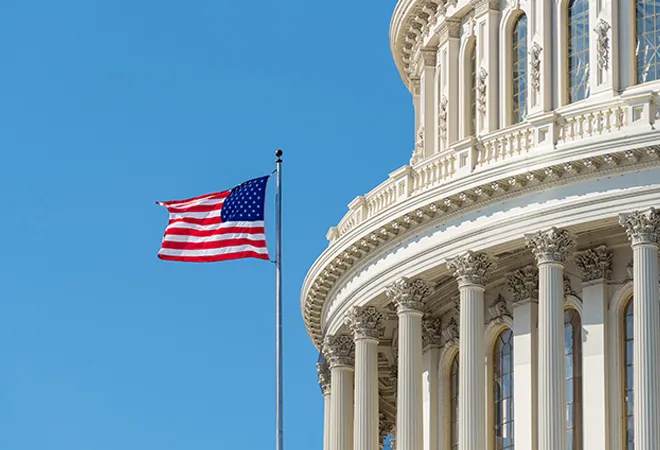-
CENTRES
Progammes & Centres
Location
The fractures in American democracy are visible as the threat from extremely conservative groups supporting former president Donald Trump looms large.

The United States (US) is at a unique political moment in history as the three arms of the US government, i.e., executive, legislature, and judiciary are in a dispute over the judicial and intelligence enquiries against former US president Donald Trump. Currently, he is facing at least six investigations including the Mar-a-Lago secret files investigation; a US Justice Department-led criminal investigation in the January 6 Capital Riots case; Georgia election results investigation; the January 6 Select Committee’s investigation; criminal, and civil probes in his business practices in New York and his Westchester golf club.
In the latest investigations, the FBI has seized as many as 100 classified files and 11,000 unclassified documents from Donald Trump’s residence in Florida on 8 August this year. Among the classified files were those under “the highest levels of classification, including Special Access Program (SAP) materials.” The search was warranted by a U.S. Department of Justice order after Donald Trump ignored a grand jury subpoena seeking all “documents bearing classification markings” and disregarded multiple requests by the National Archives and Records Administration to give government documents to the agencies, as required by federal law in the US.
The recent judgement by Judge Aileen M. Cannon to grant a special master to review the materials and documents seized from President Trump’s Mar-a-Lago residence.
What began as a tussle between the legislature and the executive with multiple ongoing probes on Donald Trump, has now also roped in the judiciary. The recent judgement by Judge Aileen M. Cannon to grant a special master to review the materials and documents seized from President Trump’s Mar-a-Lago residence. The step has been hailed as a victory for President Trump as well as severely criticised by legal experts as flawed. Broadly, the Republican belief that the DOJ may not give Trump a fair trial, requiring an independent arbiter, shows the creeping mistrust in the judicial system along the lines of partisan politics in the US.
In what may be the next steps, the special master could be named by Judge Aileen M. Cannon leading to a long process of evaluation of documents. Alternatively, the Justice Department could appeal against the decision it has brought to halt the Department of Justice’s evaluation of the seized documents from President Trump’s home until the special master’s review of the documents is completed or any further court order in this regard. However, the investigations being conducted by the Office of the Director of National Intelligence will not be obstructed as a result of the new appointment of a special master.
The latest judicial decision has run into controversy for various reasons. First, the decision to grant a special master to Donald Trump could be expansive in that its mandate will not just be limited to superseding the attorney-client privilege but also the executive privilege. Second, the step to appoint an independent arbiter to look and evaluate the documents seized by the FBI from President Trump’s home in Florida could significantly delay the ongoing legal proceedings as the DOJ has claimed that its “filter team” had already sifted through the documents. Finally, the legal basis of the decision to grant a special master has been contested by Former Attorney General William Barr who called it ‘deeply flawed’. Supporters of the decision have defended the step to give the former president a fair chance lest he suffers a reputational 'injury', —as was also argued in the case by Judge Cannon.
The executive privilege clause in the US Constitution has once again become the centre of an emerging political debate in the US. The latest step by Judge Cannon poses a test for the executive privilege of a former president, seeking to redraw the limits of Trump’s post-White House powers. There is a strong assessment that President Trump may invoke executive privilege if the trajectory of the ongoing investigation against him moves towards an indictment. If he indeed invokes the guardrails under executive privilege, it is not clear what will be the outcome as the jury is out on the limits of executive privilege that can be granted to a former president, especially when the latter is from a different political party. In this, the role of the judiciary will be critical as the doctrine of executive privilege as enshrined in the US Constitution is bounded in its implementation by the principle of judicial review. In other words, the executive privilege may reflect different considerations in different situations.
Supporters of the decision have defended the step to give the former president a fair chance lest he suffers a reputational 'injury', —as was also argued in the case by Judge Cannon.
The historical precedent is the Nixon vs Administrator of General Services case in which the US Supreme Court rejected President Nixon’s attempts to block documents from being shared with the National Archives. Although the Supreme Court during Nixon’s era had ruled that a sitting president’s executive privilege will weigh over that of a former president because of the “assertion of a privilege against the very Executive Branch in whose name the privilege is invoked,” there is some anticipation that Trump’s legal battles over the ongoing January 6 committee and the FBI investigations could further redraw the limits of executive privilege and leave legal and executive precedents for times to come. As the nature of the investigation against President Trump concerns issues of national security, the odds against his assertion of the executive privilege holding ground are high. For instance, despite Trump’s assertion of executive privilege, the Supreme Court ordered that the January 6 Committee could access Trump’s White House records from the National Archives.
Irrespective of how the investigations on Donald trump unfold, it is already fuelling the heat before the midterm election in November. In what was a political campaign pitch, President Biden on 1 September attacked his predecessor for launching an assault on democracy. He said, “Donald Trump and the MAGA Republicans represent an extremism that threatens the very foundations of our Republic,”. Quoting both the US Constitution and the Declaration of Independence of the US in this speech, he set the tone of his midterm campaign which is expected to be around the nature of liberal democracy which the US should represent. His poll ratings continue to be below 40, with 57 percent of the Americans disapproving of the sitting US president.
As the US approaches a politically charged climate with upcoming midterm elections in November, the results of the investigations on Donald Trump could be critical in shifting the voting pattern in the country and organisational behaviour among Donald Trump’s supporters. Whilst President Biden’s poll ratings remain below encouraging, Trump’s support could find a sympathy surge because of the investigations. Glimpses of Trump supporters in Biden’s latest campaign rally in Philadelphia could be a precursor to the large political mobilisation which Donald Trump can muster. There were 74 million voters of Donald Trump in the last presidential elections and he seems to retain substantial support in the Republican Party, boosting his chances to run for Presidency in 2024.
Quoting both the US Constitution and the Declaration of Independence of the US in this speech, he set the tone of his midterm campaign which is expected to be around the nature of liberal democracy which the US should represent.
Biden’s recent campaign speech at the reception for the Democratic National Committee pointed out that there is an imminent threat to democracy from the ‘MAGA Republicans”—distinguishing them from the “mainstream Republicans”. He explicitly called the democratic situation in the US; “Not Normal”. Whilst it may have been a political campaign speech to boost the chances of the Democratic Party, a potent threat from extremely conservative groups supporting former president Donald Trump looms large over US domestic politics. The open acknowledgement of the nature of the threat by a sitting US president is telling of the democratic backsliding the US has gone through in the past few years. From the political mobilisation of ultra-conservative militia groups like the Oath Keepers and Proud Boys during the Donald Trump era leading up to the January 6 2021 attacks on Capitol Hill, the state of US democracy has regressed substantively in the past few years. In November 2021, the US was listed as a ‘backsliding democracy’ for the first time by a European think-tank, outlining the gravity of concerns.
Today, the democracy in the US is indeed at an inflection point where the Republicans and the Democrats are divided by slogans of ‘real America’ and ‘soul of the nation’. These fractures are likely to keep resurfacing in varying degrees as America approaches key elections—midterms in November 2022 and the presidential elections in 2024.
The views expressed above belong to the author(s). ORF research and analyses now available on Telegram! Click here to access our curated content — blogs, longforms and interviews.

Vivek Mishra is Deputy Director – Strategic Studies Programme at the Observer Research Foundation. His work focuses on US foreign policy, domestic politics in the US, ...
Read More +